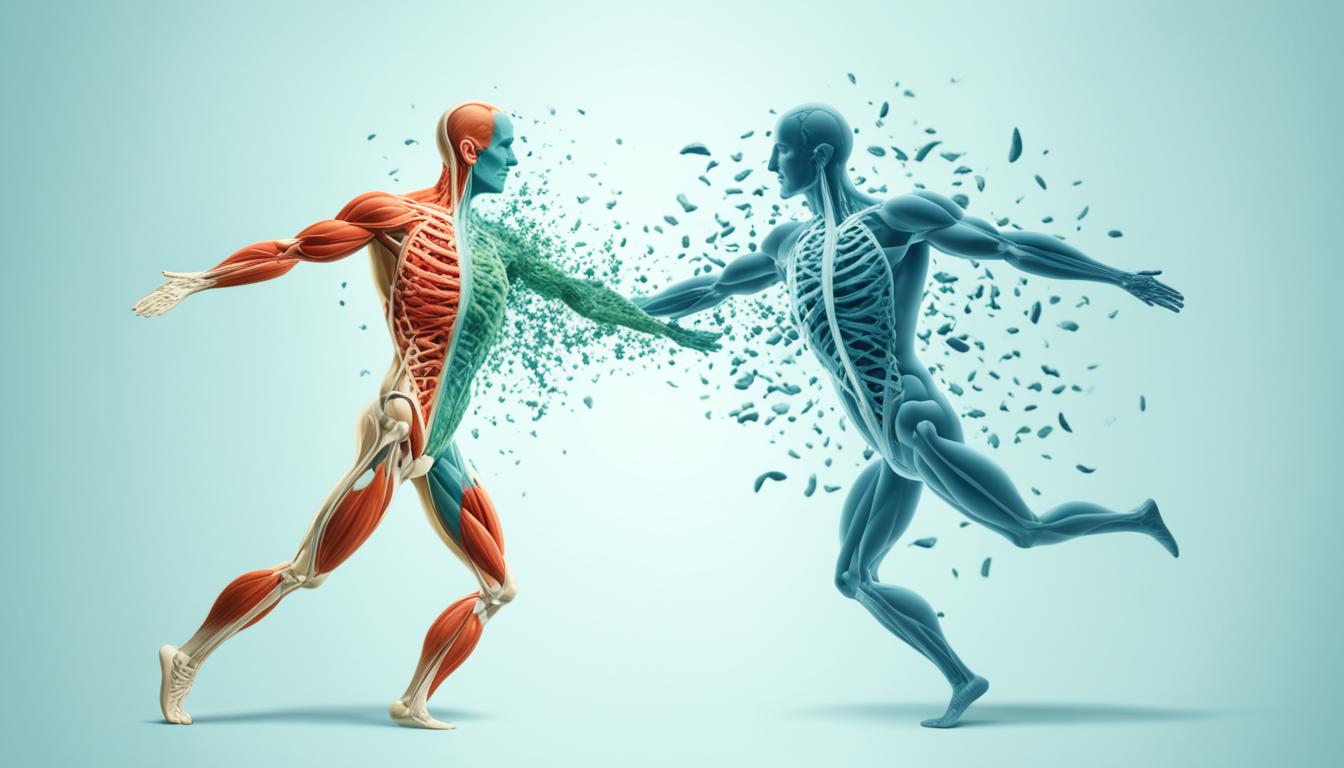“Effects of Ignoring Mental Health on Physical Well-Being”. It’s no secret that your mental health and physical well-being are interconnected. The mind and body have a profound connection that influences your overall health and quality of life. Ignoring your mental health can have significant consequences for your physical well-being, affecting various aspects of your life, including your emotional well-being and holistic wellness.
The impact of mental health on physical health is undeniable. Mental health issues such as stress, anxiety, and depression can manifest in physical symptoms and increase the risk of chronic conditions. The mind-body connection means that poor mental health can affect your hormonal balance, executive function skills, digestive health, energy levels, and sensitivity to stressors.
Children and teens are also vulnerable to the long-term physical effects of mental health issues, which can impact their overall health and lifespan. It is crucial to recognize the importance of mental health and take steps to prioritize and address it to maintain a healthy and balanced life.
Key Takeaways:
- Ignoring mental health can have significant consequences for physical well-being.
- Mental health issues can lead to physical symptoms and increase the risk of chronic conditions.
- The mind-body connection means that poor mental health can affect various areas of your physical well-being.
- Children and teens are also susceptible to the physical effects of mental health issues.
- Prioritizing mental health is crucial for maintaining a healthy and balanced life.
Physical Reactions to Mental Health Issues
Mental health issues can have profound effects on your physical well-being. Chronic stress, anxiety, and depression can trigger a range of physical reactions in your body. Let’s delve into some of these reactions:
1. Increased Cortisol Levels:
When you experience mental health issues, your body’s stress response is activated, leading to the release of cortisol. Extended periods of stress can cause a surge in cortisol levels, which can have various negative consequences on your physical health. These consequences may include:
- Weight Gain: Elevated cortisol levels can contribute to weight gain, particularly in the abdominal area.
- High Blood Sugar: Cortisol can impact blood sugar regulation, increasing the risk of developing diabetes.
- Skin Changes: Cortisol can also affect the health and appearance of your skin, leading to acne, eczema, or other skin conditions.
- Other Medical Issues: Prolonged exposure to high cortisol levels may increase the likelihood of developing medical conditions like cardiovascular disease and compromised immune function.
2. Impaired Executive Function:
Mental health issues like depression and anxiety can also impair your executive function skills. Executive function refers to a set of cognitive abilities essential for tasks such as planning, problem-solving, and decision-making. When your executive function is compromised, you may experience difficulties managing work tasks, organizing your daily routine, or completing assignments. This impairment can have an impact on your overall productivity and ability to function effectively, both at home and in the workplace.
3. Digestive Distress:
The mind-body connection is powerful, and mental health can significantly influence your digestive health. Stress, anxiety, and depression can trigger digestive distress and disrupt healthy gut function. Symptoms can range from stomachaches, bloating, and constipation to diarrhea and altered bacterial balance in the gut. These disturbances can impact nutrient absorption, bowel regularity, and overall gastrointestinal well-being.
4. Reduced Energy and Sleep Disturbances:
Individuals with mental health issues often experience reduced energy levels and difficulties with sleep. The constant mental and emotional strain can leave you feeling fatigued, both physically and mentally. You may find it challenging to muster the energy to engage in daily activities or hobbies you once enjoyed. Additionally, sleep disturbances like insomnia or excessive sleepiness can further contribute to feelings of exhaustion and impact your overall quality of life.
5. Pseudo-Symptoms and Sensitivity to Stressors:
Stress and anxiety can often manifest as physical symptoms that mimic severe physical disorders. These pseudo symptoms can include heart palpitations, muscle spasms, psychogenic non-epileptic seizures, and sensory disruptions. Moreover, mental health issues can make you more sensitive to stressors, causing a heightened reaction to even minor stress triggers. This heightened sensitivity can exacerbate physical reactions and intensify the impact of mental health issues on your overall well-being.
Understanding the physical reactions that can occur as a result of mental health issues is crucial. Recognizing and addressing these reactions can help you take proactive steps toward better overall health and well-being.
Mental Health and Chronic Diseases
Mental health has a significant impact on chronic illnesses. Depression has been linked to various chronic conditions, such as diabetes, asthma, cancer, cardiovascular disease, and arthritis. Schizophrenia is also associated with a higher risk of heart and respiratory diseases. Mental health conditions can also worsen the management of a chronic illness.
Individuals with mental health issues are more likely to suffer from sleep disorders, which can further complicate their overall health. Smoking rates are higher among those with mental health conditions, as nicotine can temporarily relieve symptoms of depression. Furthermore, individuals with mental health conditions often face barriers to accessing adequate healthcare, which can impact their ability to take care of their physical well-being.
| Chronic Illness | Associated Mental Health Conditions |
|---|---|
| Diabetes | Depression, anxiety |
| Asthma | Depression |
| Cancer | Depression, anxiety |
| Cardiovascular Disease | Depression, anxiety |
| Arthritis | Depression |
The Impact of Mental Health on Sleep
Sleep problems are common among individuals with mental health issues. Depression and anxiety can disrupt sleep patterns, leading to insomnia or excessive sleepiness. Lack of quality sleep can worsen mental health symptoms and contribute to a vicious cycle of poor mental and physical health.
“Sleep disorders and mental health issues often go hand in hand. Treating sleep problems can help improve mental well-being and overall health.” – Dr. Elizabeth Johnson, Psychiatrist
Smoking and Mental Health
Smoking rates are higher among individuals with mental health conditions. Nicotine in cigarettes can temporarily alleviate symptoms of depression, leading to a higher likelihood of smoking addiction. However, smoking has detrimental effects on both mental and physical health and can exacerbate the symptoms of mental health disorders.
- Nicotine addiction
- Increased risk of cardiovascular disease
- Worsened symptoms of anxiety and depression
Access to Healthcare and Mental Health
Individuals with mental health conditions often face barriers when it comes to accessing adequate healthcare. This can be due to stigma, lack of financial resources, limited availability of mental health services, or systemic barriers. The struggle to access healthcare can have profound implications for managing both mental health and chronic physical illnesses.
“Improving access to mental healthcare services is essential for promoting better overall health outcomes for individuals with mental health conditions.” – Dr. Sarah Thompson, Psychologist
The Impact of Physical Health on Mental Health
Physical health conditions can have a profound impact on your mental well-being. When you experience chronic physical conditions like psoriasis, it can lead to emotional and psychological distress, significantly affecting your overall health and quality of life. Dealing with a diagnosis of cancer or recovering from a heart attack can also trigger feelings of depression or anxiety, further impacting your mental health.
It is not uncommon for approximately one-third of individuals with serious medical conditions to develop symptoms of depression. Therefore, it is crucial to recognize the connection between physical health and mental well-being and take proactive steps to support both aspects of your health.
There are several ways you can take care of your physical and mental health simultaneously:
- Regular exercise: Engaging in physical activities boosts your mood, releases endorphins, and helps reduce stress and anxiety. It also enhances your overall physical health and promotes general well-being.
- Maintaining a proper diet: Eating a balanced diet that includes nutrient-rich foods nourishes your body and mind. A healthy diet can improve your energy levels, mood, and cognitive function.
- Avoiding substances like alcohol and drugs: Substance abuse can have detrimental effects on both your physical and mental health. By avoiding these substances, you protect your well-being and improve your overall quality of life.
- Getting enough sleep: Adequate sleep is essential for your body and mind to rejuvenate and recover. It is foundational for maintaining optimal physical and mental health.
- Practicing relaxation techniques: Incorporating relaxation techniques such as deep breathing, meditation, and mindfulness into your routine can help calm your mind, reduce stress, and improve your mental well-being.
- Seeking emotional support: Connecting with loved ones, friends, or support groups can provide a valuable source of emotional support. Sharing your feelings and experiences with others can help alleviate stress and improve your mental health.
Remember, taking care of your physical health is just as important as taking care of your mental health. By prioritizing both aspects, you can enhance your overall well-being and lead a happier, healthier life.
| Physical Health Conditions | Mental Health Impact |
|---|---|
| Psoriasis | Emotional and psychological distress |
| Cancer | Feelings of depression or anxiety |
| Heart Attack | Increased risk of depression or anxiety |
| General Well-being | Improved mental health through exercise, diet, sleep, relaxation techniques, and emotional support |
Understanding Mental Health vs. Mental Illness
It is important to differentiate between mental health and mental illness. Mental health refers to an individual’s state of mind, encompassing thoughts, feelings, behaviors, and interactions with the world. Mental health can fluctuate based on life circumstances, even without the presence of a mental health condition. Mental illness, on the other hand, refers to specific diagnoses like anxiety disorders, depression, bipolar disorder, ADHD, and schizophrenia.
While not everyone has a mental illness, everyone has mental health.
It is essential to prioritize mental health regardless of the presence of a mental health condition. Good mental health involves maintaining emotional well-being, cultivating positive relationships, managing stress effectively, and having a healthy state of mind. It is about finding balance in life and taking care of your mental well-being.
“Your mental health is just as important as your physical health. It affects how you think, feel, and act every day. Taking care of your mental health contributes to overall well-being and can help you cope with the challenges life throws at you.”
The Impact of Mental Health Conditions
Mental health conditions can significantly affect an individual’s quality of life and overall functioning. They can manifest in various ways, ranging from mild to severe symptoms. Mental health conditions can impact an individual’s ability to concentrate, regulate emotions, manage stress, maintain healthy relationships, and perform daily activities.
Additionally, mental health conditions can have physical manifestations and impact physical well-being. Conditions like chronic anxiety can lead to muscle tension, headaches, and digestive problems. Depression can cause changes in appetite and sleep patterns. Therefore, seeking appropriate support and treatment for mental health conditions is essential for overall well-being.

The Importance of Mental Health Maintenance
Maintaining good mental health is a lifelong commitment that requires ongoing attention and self-care. Just as you take care of your physical health through exercise, healthy eating, and regular check-ups, it is crucial to prioritize your mental well-being.
Some strategies for promoting good mental health include:
- Cultivating healthy relationships and seeking emotional support from loved ones
- Engaging in regular physical activity
- Practicing stress management techniques such as mindfulness or deep breathing exercises
- Getting enough sleep and maintaining a regular sleep schedule
- Engaging in activities that bring you joy and relaxation
- Seeking professional help when needed, such as therapy or counseling
Mental Health Support Resources
If you’re struggling with your mental health, it’s important to reach out for support. There are numerous resources available to help you on your mental health journey. These resources include:
- Mental health helplines that provide immediate support and guidance
- Online resources, blogs, and self-help books that offer valuable information and coping strategies
- Therapy or counseling services that provide a safe and non-judgmental space to address your mental health concerns
- Support groups where you can connect with others who may be experiencing similar challenges
Remember, prioritizing your mental health is an important part of maintaining overall well-being. Don’t hesitate to reach out and seek the support you need to lead a healthier and happier life.
Mental Health vs. Mental Illness
| Mental Health | Mental Illness |
|---|---|
| Refers to an individual’s state of mind | Specific diagnoses such as anxiety disorders, depression, bipolar disorder, ADHD, and schizophrenia |
| Encompasses thoughts, feelings, behaviors, and interactions with the world | May involve significant impairments in daily functioning and well-being |
| Can fluctuate based on life circumstances | Persists over time and may require treatment and support |
| Everyone has mental health | Not everyone has a mental illness |
| Prioritizing mental health is important for overall well-being | Seeking appropriate support and treatment is crucial for managing mental illness |
The Consequences of Ignoring Mental Health
Ignoring mental health can have severe consequences. When you neglect your mental well-being, your moods become unstable, and you may find it difficult to maintain healthy self-esteem. Moreover, ignoring mental health can cause strain on your relationships, leaving you feeling disconnected and isolated.
But the consequences extend beyond your emotional state. Ignoring mental health also puts you at an increased risk of developing mental illnesses, such as anxiety disorders and depression. These conditions can significantly impact your overall quality of life, affecting your daily functioning and hindering your ability to enjoy life’s experiences.
Additionally, neglecting your mental health can have physical consequences. Mental distress can lead to an increased risk of physical illnesses, such as heart disease, autoimmune disorders, and chronic pain conditions. The mind and body are intricately connected, and neglecting one aspect can have a detrimental impact on the other.
To emphasize the risks of ignoring mental health:
“When you ignore mental health, you not only compromise your emotional well-being but also put your physical health at risk. It is essential to prioritize and address mental health concerns to safeguard holistic wellness.”
It is crucial to acknowledge the consequences of ignoring mental health and take proactive steps to care for your well-being. By seeking support from professionals, practicing self-care, and prioritizing your mental health, you can create a healthier and more fulfilling life.
Strategies for Promoting Positive Mental Health
To promote mental health and well-being, there are several effective strategies you can incorporate into your daily life. By focusing on personal attributes, healthy lifestyle factors, emotional support, exposure to nature, self-care, checking in with yourself, and early intervention, you can maintain positive mental health and enhance your overall well-being.
1. Personal Attributes
Developing personal attributes such as a positive outlook, strong problem-solving skills, and effective coping abilities can contribute to your mental well-being. These attributes enable you to approach challenges in a proactive and resilient manner, enhancing your ability to manage stress and navigate difficult situations.
2. Healthy Lifestyle Factors
Your lifestyle choices have a significant impact on your mental health. Adopting a balanced diet that includes nutritious foods can provide the essential nutrients your brain needs to function optimally. Engaging in regular physical exercise helps reduce stress, improve mood, and boost overall mental well-being. Prioritizing adequate sleep and avoiding substances like alcohol and drugs also support mental health.
3. Emotional Support
Having a strong support system of friends and family is vital for promoting positive mental health. Emotional support from loved ones provides a sense of belonging and connection, reducing feelings of loneliness and isolation. Talking openly and honestly about your emotions and experiences with trusted individuals can help alleviate stress, provide comfort, and foster emotional well-being.
4. Exposure to Nature
The healing power of nature has been widely recognized. Spending time in natural environments, such as parks, forests, or gardens, can have a significant impact on your mental health. Connecting with nature has been shown to reduce stress, improve mood, increase creativity, and promote overall well-being. Take time to enjoy outdoor activities, go for walks, or simply sit and relax in green spaces.
5. Self-Care
Practicing self-care is essential for maintaining positive mental health. Engage in activities that bring you relaxation and happiness, such as practicing mindfulness, participating in hobbies, listening to music, or taking warm baths. Prioritizing self-care allows you to recharge, reduce stress levels, and enhance your overall sense of well-being.
6. Checking in with Yourself
Regularly checking in with yourself is a crucial aspect of maintaining positive mental health. Take time to reflect on your emotions, thoughts, and needs. Ask yourself how you are feeling and what you may need to support your well-being. Journaling, meditation, or engaging in regular self-reflection practices can help you gain a deeper understanding of yourself and identify areas that require attention.
7. Early Intervention
Early intervention is key when it comes to mental health. If you notice any signs of distress, anxiety, or depression, seek help as soon as possible. Don’t hesitate to reach out to a mental health professional or counselor who can provide guidance and support. Early intervention can prevent further deterioration of mental health and help you find effective strategies to manage your well-being.
By implementing these strategies, you can promote positive mental health, enhance your well-being, and cultivate a fulfilling and balanced life.

| Strategies for Promoting Positive Mental Health | Benefits |
|---|---|
| Personal Attributes | – Positive outlook – Strong problem-solving skills – Effective coping abilities |
| Healthy Lifestyle Factors | – Balanced diet – Regular exercise – Adequate sleep – Avoidance of substances |
| Emotional Support | – Sense of belonging – Reduced feelings of loneliness – Stress alleviation |
| Exposure to Nature | – Stress reduction – Improved mood – Increased creativity |
| Self-Care | – Relaxation – Stress reduction – Enhanced well-being |
| Checking in with Yourself | – Self-awareness – Identification of needs – Emotional well-being |
| Early Intervention | – Prevention of deterioration – Effective management strategies |
Importance of Early Intervention in Mental Health
Early intervention plays a vital role in the successful management of mental health and mental illness. By seeking help and intervention as soon as possible, you can prevent further deterioration of your mental health and find solutions sooner. Professional help, such as counseling, can be incredibly valuable for individuals needing additional support.
Counseling provides a safe space to process your thoughts and feelings without judgment. It is available in various formats, including in-person, over the phone, or through video calls, allowing for flexibility and convenience. Whether you are experiencing mild symptoms or are in a more challenging situation, seeking help at any stage, even before reaching a crisis point, is highly recommended for better mental health outcomes.
“Remember, early intervention is key to successfully managing your mental health and finding the support you need.”
Early intervention allows you to take control of your mental well-being and seek appropriate help to address any concerns or challenges you may be facing. It can help prevent your mental health from worsening and enable you to develop effective coping strategies. By addressing issues early on, you increase your chances of successful management and a more positive mental health journey.
Additionally, early intervention in mental health not only benefits individuals but also has a wider societal impact. By seeking help early, individuals can avoid reaching crisis points that may require more intensive interventions and support. This proactive approach contributes to building a healthier community and reducing the impact of mental health issues on individuals’ lives.
Promoting the Benefits of Early Intervention
It’s important to raise awareness about the benefits of early intervention in mental health and to encourage individuals to seek help when needed. Education and destigmatization play a crucial role in empowering individuals to prioritize their mental well-being and seek the necessary support.
Supporting Early Intervention with Statistics
| Benefits of Early Intervention | Statistics |
|---|---|
| Improved outcomes for mental health conditions | Research shows that early intervention can lead to better treatment outcomes, improved quality of life, and reduced long-term disability. |
| Decreased risk of crisis situations | Seeking help early can help prevent mental health issues from escalating to crisis situations, reducing the need for hospitalizations or emergency interventions. |
| Enhanced functioning in daily life | Early intervention supports individuals in developing effective coping strategies, improving their ability to manage stress, maintain relationships, and perform well in school or work. |
| Improved overall well-being | Addressing mental health concerns early contributes to better overall well-being, including improved emotional resilience, increased self-esteem, and enhanced quality of life. |
If you’re experiencing any signs or symptoms of mental health issues, don’t hesitate to seek help. Early intervention can make a significant difference in successfully managing your mental health and promoting your overall well-being.

The Importance of Mental Health in Everyday Life
Mental health plays a crucial role in your everyday life. It is not just about the absence of mental illness but also about your overall well-being. Prioritizing your mental health is equally as important as taking care of your physical health. When you prioritize your mental well-being, you enable yourself to lead a fulfilling and balanced life.
Impact on General Well-being
Your mental health has a direct impact on your general well-being. When you have good mental health, you are more likely to experience positive emotions, have a sense of purpose, and find satisfaction in your everyday life. It allows you to navigate life’s challenges with resilience and adaptability.
On the other hand, poor mental health can lead to feelings of sadness, helplessness, and irritability. It can affect your ability to cope with stress and prevent you from fully engaging in and enjoying your daily activities.
Enhanced Relationships
Your mental health also influences your relationships with others. When you prioritize your mental well-being, you are better able to communicate effectively, show empathy, and build healthy connections. These qualities contribute to stronger and more fulfilling relationships.
Neglecting your mental health, on the other hand, can result in increased conflict, difficulty in expressing your needs, and feelings of isolation. It can strain relationships and hinder your ability to connect with others on a deeper level.
Improved Productivity
Taking care of your mental health has a positive impact on your productivity. When your mind is in a healthy state, you are better able to concentrate, make decisions, and stay motivated. This leads to increased focus and efficiency in your work or daily tasks.
Ignoring your mental well-being, on the other hand, can lead to reduced productivity, difficulty concentrating, and decreased motivation. It can make it challenging to meet deadlines or accomplish tasks effectively, impacting your overall performance.
Increased Happiness and Self-esteem
Your mental health significantly influences your happiness and self-esteem. When you prioritize your mental well-being, you are more likely to experience positive emotions, enjoy life’s pleasures, and have a positive outlook on yourself and your abilities.
When you neglect your mental health, it can lead to feelings of sadness, low self-esteem, and a negative perception of yourself and your capabilities. This can hinder your overall happiness and prevent you from fully embracing and enjoying life.
Taking care of your mental health is a journey that requires ongoing attention and effort. It involves adopting healthy lifestyle factors, seeking emotional support, practicing self-care, and being aware of when to seek early intervention if needed.
Remember, your mental health is just as important as your physical health. Prioritizing it allows you to lead a fulfilling and balanced life, enhance your relationships, perform better in various aspects, and have a positive sense of self.
| Benefits of Prioritizing Mental Health in Everyday Life |
|---|
| Improved general well-being |
| Enhanced relationships |
| Increased productivity |
| Heightened happiness and self-esteem |
Resources for Mental Health Support
When it comes to mental health, having access to resources and support is essential for your well-being. Whether you’re facing a specific issue or simply want to prioritize your mental well-being, there are numerous options available to you. Seeking professional help, such as counseling, can provide valuable guidance and a safe space to address your mental health concerns. Counseling professionals are trained to help individuals navigate their emotions, thoughts, and behaviors, offering support and guidance tailored to their unique needs.
Aside from professional help, there are various organizations and helplines dedicated to mental health support. These organizations often offer resources and guidance specific to different mental health conditions, empowering you with the knowledge and tools to manage your well-being effectively. Online resources, blogs, and self-help books can also be valuable sources of information, providing insights, techniques, and strategies to maintain your mental well-being.
Remember, it’s crucial to utilize these resources and reach out for help when needed. Your mental health matters, and seeking support can make a significant difference in your overall well-being. Take the first step towards improving your mental health today.
| Resource | Description |
|---|---|
| National Suicide Prevention Lifeline | A 24/7 helpline offering support, crisis intervention, and local resources for individuals in distress |
| National Alliance on Mental Illness (NAMI) | An organization providing education, support, and advocacy for individuals and families affected by mental illness |
| Psychology Today | An online directory that allows you to search for therapists, counselors, and other mental health professionals in your area |
| National Institute of Mental Health (NIMH) | A leading research institution providing valuable information on mental health conditions, treatment options, and research advancements |
| Mental Health America | An organization offering a wide range of resources, including screening tools, informative articles, and local support groups |
These resources are just a starting point, and there are many more available depending on your specific needs. Remember, seeking support is a sign of strength, and there are people and organizations ready to help you on your mental health journey. Take advantage of these resources and prioritize your well-being.
Conclusion
Ignoring your mental health can have significant consequences for your physical well-being. Poor mental health can lead to various physical symptoms and increase the risk of chronic conditions. It is crucial to recognize the mind-body connection and prioritize mental health for holistic well-being.
To maintain positive mental health, it is important to focus on personal attributes such as having a positive outlook, problem-solving skills, and coping abilities. Adopting healthy lifestyle factors, including a balanced diet, regular exercise, adequate sleep, and avoiding substances like alcohol and drugs, can also support your mental well-being.
Emotional support from friends and family, as well as exposure to nature, are also vital for maintaining positive mental health. Practicing self-care activities, regularly checking in with yourself, and seeking early intervention whenever needed are essential steps toward a healthier and happier life.
Remember, taking care of your mental health is just as important as taking care of your physical health. By recognizing and addressing mental health concerns, you can maintain a positive mind-body connection and achieve overall well-being.
FAQ
How does ignoring your mental health affect your physical well-being?
Ignoring your mental health can have a significant impact on your physical well-being. Mental health issues such as stress, anxiety, and depression can lead to various physical symptoms and increase the risk of chronic conditions like arthritis, COPD, high blood pressure, diabetes, heart disease, and stroke.
Poor mental health can also affect the body’s hormonal balance, executive function skills, digestive health, energy levels, and sensitivity to stressors. Children and teens are also vulnerable to the long-term physical effects of mental health issues, which can impact their overall health and lifespan.
What physical reactions can occur due to mental health issues?
Mental health issues can lead to various physical reactions in the body. Chronic stress can cause an increase in cortisol levels, which can result in weight gain, high blood sugar, skin changes, and other medical issues. Depression and anxiety can impair executive function skills, leading to poor work performance and difficulty in completing tasks.
Mental health also influences digestive health, causing symptoms like gut distress and altered bacterial balance. Reduced energy, motivation, and sleep disturbances are common in individuals with mental health issues.
Moreover, stress and anxiety can manifest as physical symptoms that mimic severe physical disorders, including heart palpitations, muscle spasms, psychogenic non-epileptic seizures, and sensory disruptions. Mental health issues can also make individuals more sensitive to future stressors, causing a stronger reaction even to minor stress triggers.
How does mental health impact chronic diseases?
Mental health has a significant impact on chronic illnesses. Depression has been linked to various chronic conditions such as diabetes, asthma, cancer, cardiovascular disease, and arthritis. Schizophrenia is also associated with a higher risk of heart and respiratory diseases.
Mental health conditions can also worsen the management of a chronic illness. Individuals with mental health issues are more likely to suffer from sleep disorders, which can further complicate their overall health. Smoking rates are higher among those with mental health conditions, as nicotine can temporarily relieve symptoms of depression.
Furthermore, individuals with mental health conditions often face barriers to accessing adequate healthcare, which can impact their ability to take care of their physical well-being.
How does physical health affect mental health?
Physical health conditions can also affect mental health. Chronic physical conditions like psoriasis can lead to emotional and psychological distress, hurting overall health and quality of life. Being diagnosed with cancer or experiencing a heart attack can also trigger feelings of depression or anxiety. Approximately one-third of people with serious medical conditions develop symptoms of depression.
Taking care of both physical and mental health is crucial for overall well-being. Incorporating regular exercise, maintaining a proper diet, avoiding substances like alcohol and drugs, getting enough sleep, practicing relaxation techniques, and seeking emotional support can all contribute to better physical and mental health.
What is the difference between mental health and mental illness?
Mental health refers to an individual’s state of mind, encompassing thoughts, feelings, behaviors, and interactions with the world. Mental health can fluctuate based on life circumstances, even without the presence of a mental health condition. Mental illness, on the other hand, refers to specific diagnoses like anxiety disorders, depression, bipolar disorder, ADHD, and schizophrenia. While not everyone has a mental illness, everyone has mental health. It is essential to prioritize mental health regardless of the presence of a mental health condition.
What are the consequences of ignoring mental health?
Ignoring mental health can have severe consequences. Neglecting mental health can lead to unstable moods, impaired self-esteem, and difficulties in relationships. It can also increase the risk of developing mental health conditions and physical illnesses.
Ignoring mental health can result in reduced energy, motivation, sleep issues, and problems with concentration and focus. It can also negatively impact school or work performance. It is crucial to address mental health issues and seek help when needed to prevent these negative consequences.
What strategies can promote positive mental health?
There are various strategies for promoting positive mental health. Personal attributes like having a positive outlook, problem-solving skills, and coping abilities contribute to mental well-being. Adopting healthy lifestyle factors such as a balanced diet, regular exercise, adequate sleep, and avoiding substances like alcohol and drugs can support mental health.
Emotional support from friends and family plays a significant role, and spending time in nature has been shown to improve mood and reduce stress. Practicing self-care activities that bring relaxation and happiness, regularly checking in with oneself, and seeking early intervention when needed are essential for maintaining positive mental health.
Why is early intervention important in mental health?
Early intervention plays a vital role in successfully managing mental health and mental illness. Seeking help and intervention as soon as possible can prevent further deterioration of mental health and enable finding solutions sooner. Professional help, such as counseling, can be beneficial for individuals needing additional support.
Counseling provides a safe space to process thoughts and feelings without judgment. It is available in various formats such as in-person, over the phone, or through video calls. Seeking help at any stage, even before reaching a crisis point, is highly recommended for better mental health outcomes.
How can you take care of both your physical and mental health?
Taking care of both physical and mental health requires ongoing attention, just like maintenance for physical fitness. Personal attributes like a positive outlook, problem-solving skills, and coping abilities contribute to mental health.
Adopting healthy lifestyle factors such as a balanced diet, regular exercise, adequate sleep, and avoiding substances like alcohol and drugs supports both physical and mental well-being. Emotional support, exposure to nature, self-care activities, regular check-ins with oneself, and early intervention when needed are essential for maintaining optimal overall health.
What is the importance of mental health in everyday life?
Mental health plays a crucial role in everyday life. It impacts general well-being, including relationships, productivity, happiness, and self-esteem. Taking care of mental health is equally important as taking care of physical health. Prioritizing mental well-being allows individuals to lead fulfilling and balanced lives, enhance their relationships, perform better in various aspects of life, and have a positive sense of self.
What resources are available for mental health support?
There are numerous resources available for mental health support. Seeking professional help, such as counseling, is highly recommended for individuals needing additional support. Counseling provides a safe and non-judgmental environment to address mental health concerns. Various organizations and helplines offer mental health support and guidance.
Online resources, blogs, and self-help books can provide valuable information and tools for maintaining mental well-being. It is essential to utilize these resources and reach out for help when needed to support overall well-being.






